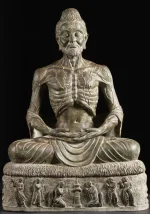- Joined
- May 8, 2017
- Messages
- 3,280
- Reaction score
- 959
- Location
- New York City area
- Gender
- Male
- Political Leaning
- Progressive
I was searching the phrase "sumptuary laws.".Sumptuary laws are laws designed to limit or discourage consumption. The effect of England's old sumptuary laws was to ensure that the rich could afford just about everything.I came across it in my reading of Friends Divided: John Adams and Thomas Jefferson by Gordon S. Wood. Going back to ancient Greek time, there was a philosopher named Epicuris, who believed (link to source):
Thinking about it now, it seeped into the U.S. via books such as the 1950's classic by John Kenneth Galbraith, The Affluent Society. This foreshadowed by other authors and thinkers, such as Travels with Charley: In Search of America by John Steinbeck. In Travels Steinbeck rails against conspicuous consumption and other signs of affluence. One of the opening paragraphs of The American Way of Death by Jessica Mitford reads:
Apparently, this goes back to John Adams and further, to the Puritans. I wonder if now it influences advocacy of self-abnegation with environmental laws and other policies.
The incoming Christian culture did not agree, as I read in The Swerve: How the World Became Modern by Stephen Greenblatt. I did not think of any modern connections in thought, Indeed, I had thought that this line of thinking was recent, a response to post-War prosperity.Stanford Encyclopedia of Philosophy said:Epicurus
First published Mon Jan 10, 2005; substantive revision Fri Jul 8, 2022
The philosophy of Epicurus (341–270 B.C.E.) was a complete and interdependent system, involving a view of the goal of human life (happiness, resulting from absence of physical pain and mental disturbance), an empiricist theory of knowledge (sensations, together with the perception of pleasure and pain, are infallible criteria), a description of nature based on atomistic materialism, and a naturalistic account of evolution, from the formation of the world to the emergence of human societies.
Thinking about it now, it seeped into the U.S. via books such as the 1950's classic by John Kenneth Galbraith, The Affluent Society. This foreshadowed by other authors and thinkers, such as Travels with Charley: In Search of America by John Steinbeck. In Travels Steinbeck rails against conspicuous consumption and other signs of affluence. One of the opening paragraphs of The American Way of Death by Jessica Mitford reads:
Jessica Mitford said:Much has been written of late about the affluent society in which we live, and much fun poked at some of the irrational "status symbols" set out like golden snares to trap the unwary consumer at every turn. Until recently, little has been said about the most irrational and weirdest of the lot, lying in ambush for all of us at the end of the road- -the modern American funeral.
Apparently, this goes back to John Adams and further, to the Puritans. I wonder if now it influences advocacy of self-abnegation with environmental laws and other policies.


